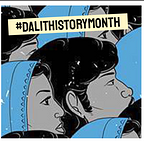Savitribai Phule: Without her, there is no Dalit History
Today in #Dalithistory month, we celebrate the legacy and contribution of Krantijyoti Savitribai Phule, who dared to challenge the Brahimincal norms by taking knowledge to all those who were forbidden.
Savitribai along with her partner Jyotirao were revolutionaries of their time. A young couple who wanted their love for one another to manifest as work for a society they felt was ill with Brahminism. They committed to its annihilation through education for women and untouchable communities.
It is important to understand that in order to try to educate women, Dalits, Adivasis and other marginalised communities, they had to break the religiously sanctioned social order against the Hindu scriptures. As soon as they began their work, they were thrown out by their family who could not bear to interact with Dalits in their premises. None of the other dominant castes would stand by then either.
It was Fatima Sheikh, a Muslim woman, who offered them refuge. She shared their vision and allowed them to use their home to start a school. Savitribai, Fatima and Jyotirao started for the first time, a school that allowed women, Adivasis, Shudras and Dalits into its fold. They proudly called it the ‘Indigenous library’. Savitri had to face severe retaliation from the dominant communities. She faced constant verbal and physical abuse for work she pursued to educate the marginalised communities. In 1848, Savitribai founded a school exclusively for girls from marginalised communities and long with Fatima Sheikh, Savitribai opened a school for Manga and Mahar girls. With an objective to empower women, Savitribai started the Mahila Seva Mandal (Women Service organization). Not confining to education alone, Savitribai initiated several progressive initiatives for the upliftment of women. Savitribai along with Jyotirao started a home for Widows and adopted a child born to a widow.
Savitribai held the idea of assertion as a core in her struggle to empower Dalits and the marginalised. She actively contributed to relief assistance during the epidemic and famines. Both Savitribai and Jyotirao assisted in famine relief by turning their schools into food centres. In 1896, Pune witnessed a massive plague epidemic. Savitribai, along with her son Yashwant who was a doctor, vigorously worked for those afflicted by the plague. She asked her son Yashwant to open a clinic at Sasane Male which was free of infection.
According to an anecdote, Savitribai carried Pandurang Babaji Gaikwad, a 10-year-old boy, from Mundhwa to the clinic. It was in the course of helping the patients that Savitribai contracted the infection and succumbed. Dr. Yashvant Rao, her son, died alongside his adopted mother Savitribai while serving plague patients.
Dr. Yashwant Rao served patients of all castes and communities as a part of his father and mother’s social reform movement. As Kancha Ilaiah Shepherd pointed out in one of his articles, Brahmins were avoiding becoming doctors at that time as the British had made it mandatory that medical partitioners treat patients of all castes, and many Brahmins were unwilling to touch Dalits and Shudras. In such times, Savitribai and her son Dr Yashwant came to the rescue of the most marginalised people.
Savitribai stood as a strong pillar who constructed the genuine approach of empowerment. Post the death of Jyotirao, Savitribai continued her reformist activities through Satyashodak Samaj (A society that seeks truth). Her literary contribution changed the outlook and approach of feminist literature. Savirtibai edited the speeches of Jyotirao and published several poems and literature of her own. Her poetry reflected the spirit of assertion and significance of education.
Savitribai along with Jyotirao contributed immensely to the upliftment of the women and Dalits. Their effort and work towards Dalits and other marginalised communities are immeasurable. The foundation that Savitri laid changed the course of education for the most marginalised like women, Dalits and Adivasis. As a teacher, social reformer and writer Savitri challenged not only caste but also patriarchy that largely affected women from marginalised communities. Savitribai is one of the first contemporary South Asian feminists in a true sense, at a time when the English speaking, ‘upper-caste’, ‘anti-colonials’ only campaigned for education for a selective section of women. In every moment of her life, Savitribai displayed the act of courage and resilience that transformed the lives of marginalised communities.
References
Tiffany K Wayne, Feminist Writings from ancient times to the modern world, Volume I, Greenwood, California, 2011.
Reeta and Vinit Raj, First Indian Women Teacher: Savitribai Phule: Biography of Savitribai Phule, Educreation Publication, New Delhi, 2018.
Nitin Bhame, When Savitribai fought plague, Aug 21, 2009, Pune Mirror.
